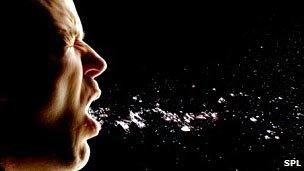Zinc can be an 'effective treatment' for common colds
- Published
- comments

Common cold viruses are spread by sneezes
Taking zinc syrup, tablets or lozenges can lessen the severity and duration of the common cold, experts believe.
A review of the available scientific evidence suggests taking zinc within a day of the onset of cold symptoms speeds recovery.
It may also help ward off colds, say the authors of the Cochrane Systematic Review that included data from 15 trials involving 1,360 people.
But they say zinc cannot be used long-term because of toxicity concerns.
Excessive amounts can cause nausea, vomiting, abdominal pain and diarrhoea.
Now more work is needed to determine the exact dosing required, say the experts.
Cold viruses
Adults catch between two to four colds a year and children up to 10 a year.
There is little a person can do to avoid these infections because the viruses responsible are so commonplace.
Cold viruses can be passed from person to person not only by coughs and sneezes but also by touching contaminated surfaces such as door handles.
There is no proven treatment for the common cold, but experts believe zinc medications may help prevent and lessen infections by coating the common cold viruses and stopping them from entering the body through the thin lining of the nose.
It also appears to stop the virus from replicating, at least in laboratory tests.
There is also the suggestion that zinc aids the immune system and may dampen down some of the unpleasant reactions the body has to an invading virus.
Speedy recovery
Lead researcher Meenu Singh, of the Post Graduate Institute of Medical Education and Research in Chandigarh, India, said: "This review strengthens the evidence for zinc as a treatment for the common cold.
"However, at the moment, it is still difficult to make a general recommendation, because we do not know very much about the optimum dose, formulation or length of treatment."
According to trial results, zinc syrup, lozenges or tablets taken within a day of the onset of cold symptoms reduce the severity and length of illness.
At seven days, more of the patients who took zinc remedies every couple of hours during the daytime had cleared their symptoms compared to those who took placebos.
And children who took 15mg of zinc syrup or zinc lozenges daily for five months or longer caught fewer colds and took less time off school.
But the 15 trials in the review all used different treatment timescales and doses, making it impossible to reach a consensus.
And the people who used zinc also reported more side effects, such as an unpleasant aftertaste or nausea, than the placebo group.
Editor in Chief of the Cochrane Library, David Tovey, said: "This is a treatment that is showing some promise which, where treating the common cold is concerned, is unusual.
"Although there are many over-the-counter cold remedies already available, we are not awash with things that can stop cold symptoms or greatly reduce their severity.
"But there is still uncertainty about the best doses, timings and formulations and more studies will be needed to look at this."
Professor Ronald Eccles, Director of the Common Cold Centre at Cardiff University, remained doubtful about zinc's benefits as a cold treatment in current formulations.
He said zinc's toxicity would also be a potential concern if taken over longer periods.